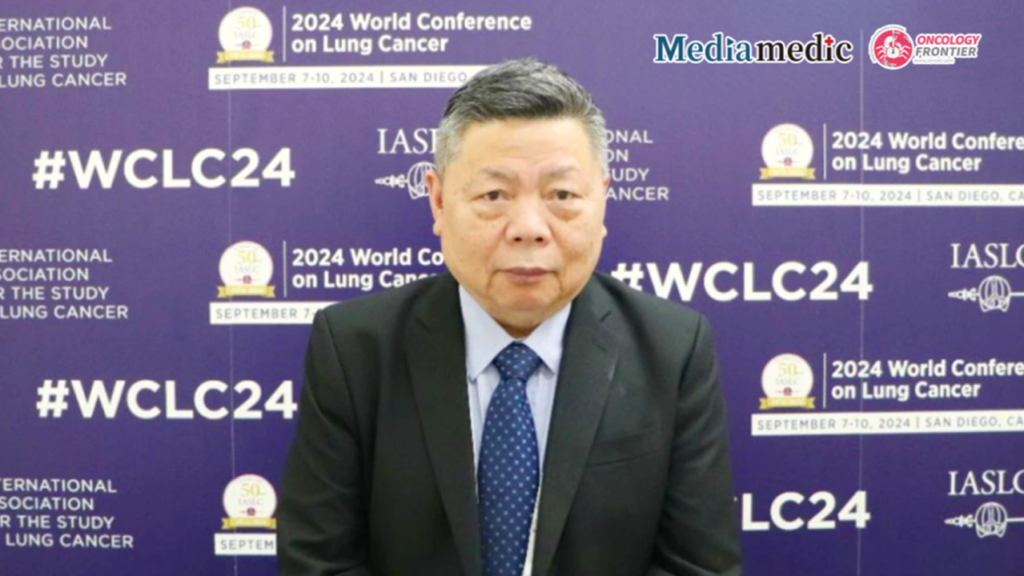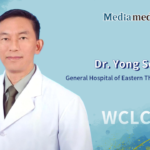
The 2024 World Conference on Lung Cancer (WCLC) recently concluded in San Diego, USA. As one of the largest academic conferences in the field of oncology, WCLC presents the latest cutting-edge advancements, covering all aspects of lung cancer research. Dr. Yilong Wu from Guangdong Provincial People’s Hospital served as an expert chair and delivered a keynote presentation during an educational session, sharing the results of several clinical trials. Oncology Frontier had the privilege of interviewing Professor Wu onsite, where he reflected on his experience attending the 2024 WCLC.01
Oncology Frontier: At the 2024 WCLC, your phase II study on Lorlatinib in ROS1-positive NSCLC patients who had previously been treated with Crizotinib and chemotherapy was presented. Can you share how Lorlatinib performed in this patient population, and what clinical insights the results offer?
Dr. Yilong Wu: ROS1 is a newly identified target in NSCLC, following EGFR and ALK, though it is a rare one, found in only 1-2% of NSCLC cases. Researchers have discovered that the tyrosine kinase domains of three targets—ALK, ROS1, and MET—share significant similarities. As a result, a drug targeting one of these domains may also have activity against the other two.
After Crizotinib was approved, we collaborated with researchers from Japan and Korea to conduct an Asian study that led to Crizotinib’s approval for ROS1-positive NSCLC. For nearly a decade, Crizotinib has been one of the standard treatments for ROS1-positive NSCLC. However, there was little progress in developing new ROS1-targeted therapies until recently, when we began seeing new inhibitors emerge, particularly in China.
When ROS1-positive NSCLC patients become resistant to Crizotinib, what are the next steps? In the past, chemotherapy was the only option, but its efficacy in this context was not very competitive. We urgently needed new targeted therapies to overcome Crizotinib and chemotherapy resistance. Lorlatinib came to mind, as it had shown excellent results in ALK-positive NSCLC, with the CROWN study reporting a median progression-free survival (PFS) that had not yet been reached, and approximately 60% of patients achieving a 5-year PFS. We wondered whether an ALK-TKI as effective as Lorlatinib could also be used for the structurally similar ROS1 target, so we initiated this phase II study.
Several institutions in China joined this phase II study, given that ROS1 is a rare target, and recruiting patients was challenging. The results were presented at this year’s WCLC, showing an objective response rate (ORR) of 44.6% in patients previously treated with Crizotinib or chemotherapy. Achieving an ORR above 30% in the second-line setting is already quite remarkable, but here we reached nearly 50%, which is an impressive efficacy result. Even more encouraging, the median PFS was 17.9 months. Historically, second-line treatments with a PFS of 8 months were considered good, but this study almost doubled that. Based on these findings, we believe Lorlatinib could be a new option for ROS1-positive NSCLC patients who have progressed on Crizotinib. This study provides a new treatment weapon for a patient population that previously had few targeted therapy options, highlighting its clinical significance.
02
Oncology Frontier: The IASLC-CSCO-CAALC Joint Session, co-organized by the International Association for the Study of Lung Cancer (IASLC), the Chinese Society of Clinical Oncology (CSCO), and the China Alliance for Lung Cancer Prevention (CAALC), was one of the highlights of the 2024 WCLC. This year marks the 11th time the China session has been held. Why was this year’s theme, “Prevention and Evidence-Based Medicine: The Past and Future of Global Lung Cancer,” chosen, and what were the key highlights of the agenda?
Dr. Yilong Wu: The China session has become a distinctive and integral part of the WCLC. Eleven years ago, when I was a member of the IASLC Board of Directors, we, along with the leaders of the China Alliance for Lung Cancer Prevention and IASLC, discussed the idea of having a dedicated China Day at WCLC. Through our joint efforts, the first China session was held at WCLC in 2013. Eleven years later, the China session has grown in popularity and has garnered significant attention from international attendees, becoming a must-see event at WCLC.
The theme of the WCLC China session closely aligns with this year’s overall WCLC theme, which celebrates the 50th anniversary of IASLC. As such, the China session also reviewed the greatest achievements in lung cancer research over the past 50 years. In my opinion, our most significant accomplishment has been the development of targeted and immunotherapy treatments, all based on evidence from clinical trials. These evidence-based studies have been fundamental to the recognition and success of our targeted and immunotherapy research.
To both reflect on the past 50 years and look toward the future, we chose “Prevention and Evidence-Based Medicine: The Past and Future of Global Lung Cancer” as the theme for the WCLC China session. The agenda was divided into three parts: the first was an educational program, the second was a series of oral presentations featuring the best abstracts, and the third was a poster discussion.
For the first part, the educational program, we aimed to balance international perspectives with Chinese insights. We invited four speakers, two from China, one from the United States, and one from Europe, in keeping with the tradition of the China session over the past few years. Dr. Chunxue Bai reviewed China’s contributions to lung cancer prevention and biomarker-guided treatment over the past 50 years, while Dr. Siyang Liu’s presentation focused on the future of immunotherapy for lung cancer. Professor Paul Hofman from France analyzed the evolution of lung cancer targeted therapies, and IASLC President Professor Karen Kelly’s presentation explored the future of lung cancer prevention and treatment, including the integration of AI into healthcare.
The second part consisted of oral presentations. This year’s oral reports focused on hot topics and emerging trends, with three abstracts selected, all related to perioperative treatments. Notably, Dr. Wenzhao Zhong from the Guangdong Lung Cancer Institute shared remarkable results from his study on Lorlatinib, where it converted previously unresectable locally advanced ALK-positive NSCLC patients into candidates for surgery.
For the poster discussion, we selected eight abstracts from more than 500 submissions to be featured in the session, with two expert guests invited to provide commentary on these posters.
Another important goal of the WCLC China session is to cultivate the next generation of experts. When we held the first China session 11 years ago, experts from my generation served as the chairs, presenters, and discussants. Ten years later, we have successfully nurtured second- and third-generation experts, many of whom took the stage this year. These new faces are young and dynamic, and through the IASLC-CSCO-CAALC Joint Session, they are stepping onto the international stage.
In summary, we hope to use the IASLC-CSCO-CAALC Joint Session as a global platform to advance lung cancer research in China. Our goal is not only to showcase China’s lung cancer prevention strategies, treatment approaches, and research to the world but also to foster academic collaboration, promote original research, and facilitate the global presence of innovative Chinese treatments. This will provide greater opportunities for the next generation of Chinese experts to thrive internationally.
Dr. Yilong Wu Professor of Oncology, PhD Supervisor Recipient of the IASLC Distinguished Scientist Award Vice President, Chinese Medical Doctor Association President, Guangdong Medical Doctor Association (GDMDA) Chief Expert, Guangdong Provincial People’s Hospital (GDPH) Honorary Director, Guangdong Lung Cancer Institute (GLCI) Chairman, Chinese Thoracic Oncology Group (CTONG) 2018-2023 Highly Cited Scientist in Clinical Medicine Former President, Chinese Society of Clinical Oncology (CSCO), and current Chair of the CSCO Advisory Committee
References:
- Yi-Long Wu, et al. A Phase II Study of Lorlatinib in Advanced ROS1+ NSCLC Pre-Treated with Crizotinib and Platinum-Based Chemotherapy. 2024 WCLC, MA06.05.


